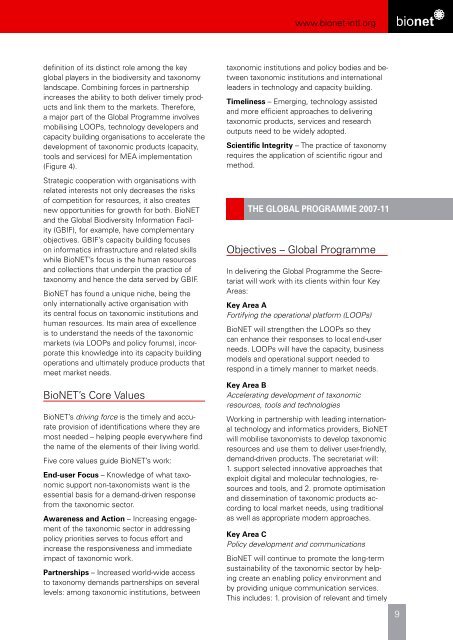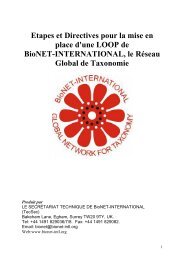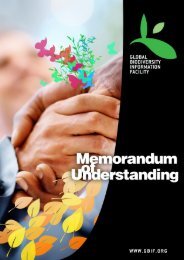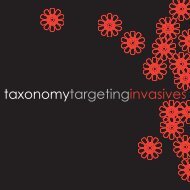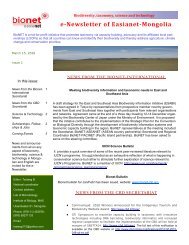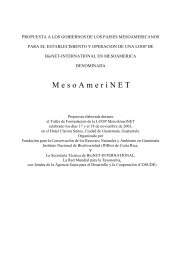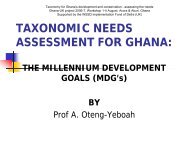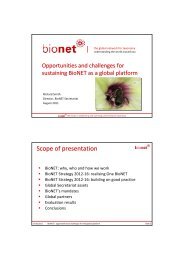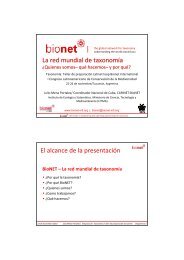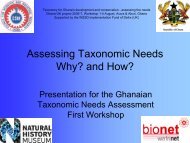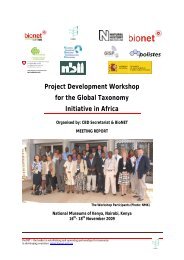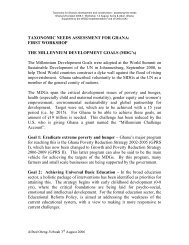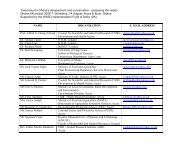Business Plan 2007 - 2011 - BioNET
Business Plan 2007 - 2011 - BioNET
Business Plan 2007 - 2011 - BioNET
Create successful ePaper yourself
Turn your PDF publications into a flip-book with our unique Google optimized e-Paper software.
www.bionet-intl.org<br />
definition of its distinct role among the key<br />
global players in the biodiversity and taxonomy<br />
landscape. Combining forces in partnership<br />
increases the ability to both deliver timely products<br />
and link them to the markets. Therefore,<br />
a major part of the Global Programme involves<br />
mobilising LOOPs, technology developers and<br />
capacity building organisations to accelerate the<br />
development of taxonomic products (capacity,<br />
tools and services) for MEA implementation<br />
(Figure 4).<br />
Strategic cooperation with organisations with<br />
related interests not only decreases the risks<br />
of competition for resources, it also creates<br />
new opportunities for growth for both. <strong>BioNET</strong><br />
and the Global Biodiversity Information Facility<br />
(GBIF), for example, have complementary<br />
objectives. GBIF’s capacity building focuses<br />
on informatics infrastructure and related skills<br />
while <strong>BioNET</strong>’s focus is the human resources<br />
and collections that underpin the practice of<br />
taxonomy and hence the data served by GBIF.<br />
<strong>BioNET</strong> has found a unique niche, being the<br />
only internationally active organisation with<br />
its central focus on taxonomic institutions and<br />
human resources. Its main area of excellence<br />
is to understand the needs of the taxonomic<br />
markets (via LOOPs and policy forums), incorporate<br />
this knowledge into its capacity building<br />
operations and ultimately produce products that<br />
meet market needs.<br />
<strong>BioNET</strong>’s Core Values<br />
<strong>BioNET</strong>’s driving force is the timely and accurate<br />
provision of identifications where they are<br />
most needed – helping people everywhere find<br />
the name of the elements of their living world.<br />
Five core values guide <strong>BioNET</strong>’s work:<br />
End-user Focus – Knowledge of what taxonomic<br />
support non-taxonomists want is the<br />
essential basis for a demand-driven response<br />
from the taxonomic sector.<br />
Awareness and Action – Increasing engagement<br />
of the taxonomic sector in addressing<br />
policy priorities serves to focus effort and<br />
increase the responsiveness and immediate<br />
impact of taxonomic work.<br />
Partnerships – Increased world-wide access<br />
to taxonomy demands partnerships on several<br />
levels: among taxonomic institutions, between<br />
taxonomic institutions and policy bodies and between<br />
taxonomic institutions and international<br />
leaders in technology and capacity building.<br />
Timeliness – Emerging, technology assisted<br />
and more efficient approaches to delivering<br />
taxonomic products, services and research<br />
outputs need to be widely adopted.<br />
Scientific Integrity – The practice of taxonomy<br />
requires the application of scientific rigour and<br />
method.<br />
THE GLOBAL PROGRAMME <strong>2007</strong>-11<br />
Objectives – Global Programme<br />
In delivering the Global Programme the Secretariat<br />
will work with its clients within four Key<br />
Areas:<br />
Key Area A<br />
Fortifying the operational platform (LOOPs)<br />
<strong>BioNET</strong> will strengthen the LOOPs so they<br />
can enhance their responses to local end-user<br />
needs. LOOPs will have the capacity, business<br />
models and operational support needed to<br />
respond in a timely manner to market needs.<br />
Key Area B<br />
Accelerating development of taxonomic<br />
resources, tools and technologies<br />
Working in partnership with leading international<br />
technology and informatics providers, <strong>BioNET</strong><br />
will mobilise taxonomists to develop taxonomic<br />
resources and use them to deliver user-friendly,<br />
demand-driven products. The secretariat will:<br />
1. support selected innovative approaches that<br />
exploit digital and molecular technologies, resources<br />
and tools, and 2. promote optimisation<br />
and dissemination of taxonomic products according<br />
to local market needs, using traditional<br />
as well as appropriate modern approaches.<br />
Key Area C<br />
Policy development and communications<br />
<strong>BioNET</strong> will continue to promote the long-term<br />
sustainability of the taxonomic sector by helping<br />
create an enabling policy environment and<br />
by providing unique communication services.<br />
This includes: 1. provision of relevant and timely


